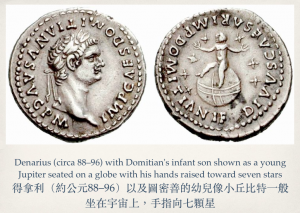21–27 December, 2014.
Revelation 13 (click to read).
For those of you following the church’s Bible reading plan, this month we read through the difficult and controversial Book of Revelation: the last book of the Bible for the end of the calendar year.
This week in our reading of Revelation we come to chapter 13, the description of the beast from the sea. John begins the description by saying: “And I saw a beast coming out of the sea. It had ten horns and seven heads, with ten crowns on its horns, and on each head a blasphemous name” (v.1).
In every chapter so far, John has been directly attacking the Roman empire and its rulers for their twin evils: The first was the way that Rome made Christians (and many other people) suffer. The second was what the Christians saw as the terrible blasphemy of the Roman emperors, who wanted to be worshipped as gods on earth. Here John’s criticism of Rome continues.
For the ancient Jews, the sea was a symbol of chaos and evil. That is why in the first creation story in Genesis 1, God begins by subduing the sea, locking up chaos, and setting boundaries for it. So it is no accident here in Revelation that the beast of the Roman empire rises out of the sea. The empire represents everything that is evil, it represents chaos and death. For the early Christians, suffering and death under the evil power of the empire was a reality of their lives.
 But what made this suffering even greater was the pride and vanity of the empire. The beast comes up with ten horns and seven heads, representing Rome’s current and past emperors and their military power. They wear crowns on their heads, and stand above all others claiming to be the kings of kings. But this is a title that the Christians knew should only ever be given to Jesus. To make matters worse, when Rome printed its money, the emperors constantly had coins made with their faces on them—and then around their heads they would write their names with titles like “god”, “son of god”, “saviour”, and “lord”. For the Christians, this was completely unacceptable: unacceptable that a human being should ever call themselves by these divine titles, names that should be saved only for Christ. Jesus Christ is the true God, he is the true Son, he is our real Saviour, he is our real Lord.
But what made this suffering even greater was the pride and vanity of the empire. The beast comes up with ten horns and seven heads, representing Rome’s current and past emperors and their military power. They wear crowns on their heads, and stand above all others claiming to be the kings of kings. But this is a title that the Christians knew should only ever be given to Jesus. To make matters worse, when Rome printed its money, the emperors constantly had coins made with their faces on them—and then around their heads they would write their names with titles like “god”, “son of god”, “saviour”, and “lord”. For the Christians, this was completely unacceptable: unacceptable that a human being should ever call themselves by these divine titles, names that should be saved only for Christ. Jesus Christ is the true God, he is the true Son, he is our real Saviour, he is our real Lord.
For the Romans, and for so many people today, to be like God means to hold great military power, to control and conquer all people. This is why (as John tells us in verse 8) the people are so quick to admire and worship this beast: because people admire power. But this is a false god, with its roots in chaos and evil and death.
As we approach Christmas, we remember that our true God and Saviour didn’t come with military power, but came as a weak and humble child into the world. And it is in his compassion and his love for all people, not in his violent power over all people, that Jesus shows himself to be the true God and Saviour of our world.
Pastor Stephen Lakkis



0 Comments